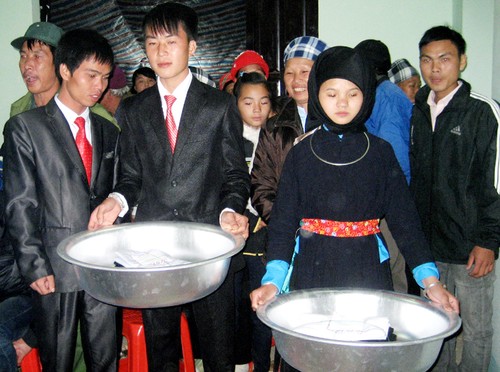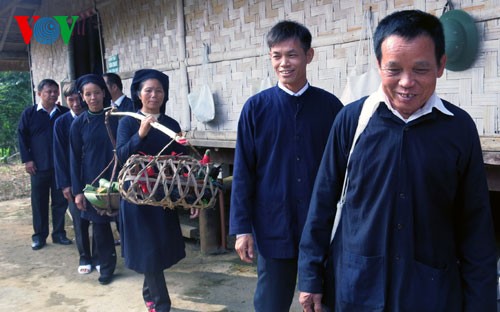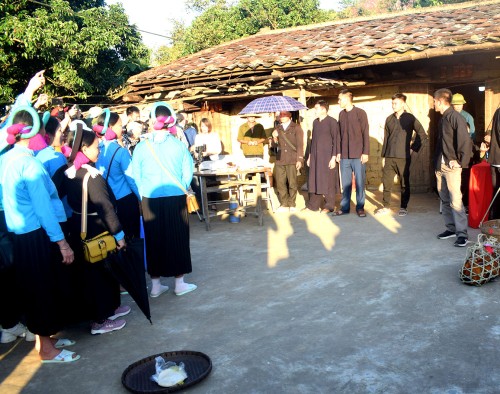 A San Chi couple in Huc Dong commune performs the necessary procedures to adopt their foster parents. (Photo: baoquangninh.com.vn) A San Chi couple in Huc Dong commune performs the necessary procedures to adopt their foster parents. (Photo: baoquangninh.com.vn)
|
“San Chi people in this region have three sets of parents – their real parents, their parents-in-law, and their foster parents.”
That’s how Dinh Van Phuc of Binh Lieu district began his story about the matchmaker’s role in San Chi weddings.
Phuc said that at their wedding ceremony, a newly-wed couple claim their matchmaker as a foster parent, who must be from a clan other than the bride or groom’s family.
In this, the San Chi people differ from the Tay and Nung people living in the same area, whose village head often plays the role of matchmaker and can be a member of the bride or groom’s clan, according to Phuc.
“A matchmaker can be a person who lives near the bride or groom’s family but cannot be a relative. The non-family matchmaker becomes the couple’s foster parent for life and must be taken care when they grow old and feeble,” said Phuc.
The foster parent is so important that a couple will consult a horoscope prior to their matchmaking ceremony.
Luc Van Binh of Ba Che district says matchmakers are selected very carefully.
“The selection of a matchmaker is very important and consulting the horoscope is a must for any major life event such as marriage. The couple and their matchmaker should be of compatible ages for becoming family members,” said Binh.
He added after the adoption ceremony is completed on their wedding day, their new foster parent gives the couple a souvenir. This is often a household item, but the preferred gift is a ring symbolizing the couple’s mutual trust and faithfulness.
According to Binh, “Some foster parents give a pair of rings, others just one ring. There is no set rule about this.”
The matchmaker plays a key role in the life of the couple, both before and after their marriage. When the matchmaker dies, they mourn him but don’t worship him.
Dam Me of Ba Che district has been the matchmaker for three local couples, who have many children and, so far, marital harmony.
Me told us that to be a matchmaker, you must be the bread winner of your own family, have marital harmony and many children, and be respected by the community. The matchmaker should also be verbally astute and understand the customs and practices of the San Chi people.
 A San Chi matchmaker leads the groom’s delegation to the bride’s house. A San Chi matchmaker leads the groom’s delegation to the bride’s house.
|
He said his work always begins with a matchmaking ceremony at the house of the bride’s family. Then he must be involved in every stage of the marriage, taking the main responsibility for conducting the rituals required of each family.
“On the wedding day, I must represent the groom’s family in welcoming their new daughter-in-law. The next day, the couple must bring an offering to my house to officially adopt me as their foster parent. In return, I give them a pair of rings. If you don’t have rings, you can give a kerchief to the girl and a hat to the boy,” said Me.
After the matchmaker is officially declared their foster parent, the newly-wed couple should visit him often, according to matchmaker Luc Van Binh.
“As soon as I put the rings on them, the couple should start calling me ‘father’. After the wedding, fostered children often bring a chicken and some sticky rice cakes to the matchmaker. From that point on, we are members of the same family, visit each other regularly, and help each other just like real relatives,” he said.
Offerings of thanks to the matchmaker often include sticky rice cakes called “Day”, symbolizing prosperity, says Me, adding, “An offering set should include 24 day cakes, representing the 24 months during which the matchmaker has helped the couple prepare for marriage.”
“The offering, of course, can be rice, but dầy cakes are more meaningful. As a rule, a Day offering should include 24 pieces,” according to Me.
A foster parent is often invited to participate in major family events, like a baby’s first-month celebration, Me told us, adding that he is consulted on how to organize the ritual in line with traditional customs.
“The couple visits the matchmaker at the New Year Festival and other holidays. After they have a child, the matchmaker attends rituals such as the one to report the child’s birth to the ancestors, which is usually performed 3 days after the birth. It’s similar to the Kinh people’s full-month celebration," said Me.
"The matchmaker takes along anything he has as a gift. It might be a chicken or a pig’s trotter, for example, to make soup for the daughter-in-law. It's that simple.”
 Relatives of the San Chi groom and bride participate in a call and response singing session at Binh Lieu Culture and Tourism Week 2020. (Photo: quangninh.gov.vn) Relatives of the San Chi groom and bride participate in a call and response singing session at Binh Lieu Culture and Tourism Week 2020. (Photo: quangninh.gov.vn)
|
Establishing a relationship between a couple and a foster parent is an old San Chi custom. It helps to create strong bonds within the community and increase the solidarity of the San Chi people.